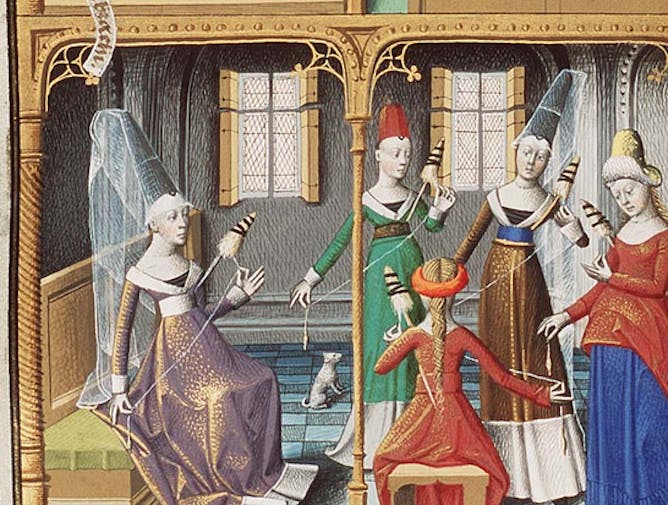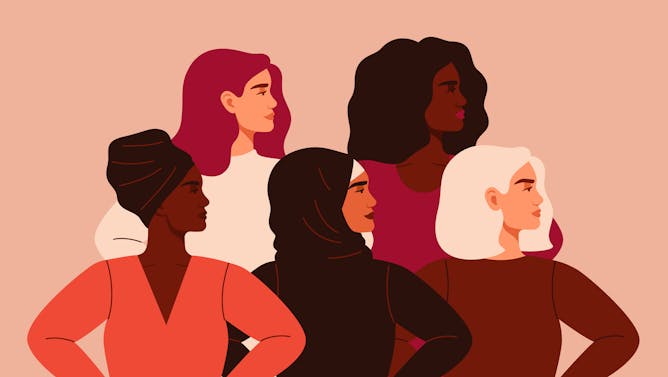|
The Way Home wives are not yet well known in the west, and since Russian media is highly censored they may not be widely recognised inside Russia either. But they are that rare beast, a Russian group who have spoken publicly about opposition to the Ukraine war, and they are getting louder. They are wives and partners of soldiers who have been sent to the frontlines indefinitely, and appear to be seen as expendable by their government. The women’s protest has moved from social media to vigils, usually at war memorials, every weekend, with security forces looking on. In another time and place, these may not have seemed the bravest methods of opposition. In today’s Russia they are.
Also this International Women’s Day, we look at how medieval women passed their own medical knowledge to others through secret social networks. It was a way of negotiating around societies where men were seen as the official holders of medical information, and women’s words were less valued.
A black woman without a disability will have a different experience of society than a white woman without a disability – or a black woman with a disability. It might seem obvious when you start to think about it, but this intersectional approach to feminism recognises that with this broader view it is possible to create a fairer society, something that International Women’s Day is all about.
|

|
Rachael Jolley
International Affairs Editor
|
|

Wives of Russian soldiers place flowers at the Tomb of the Unknown Soldier at the Kremlin wall, Moscow.
AP/Alamy
Jennifer Mathers, Aberystwyth University; Natasha Danilova, University of Aberdeen
Opposition from soldiers’ wives is an underestimated form of resistance against Vladimir Putin.
|

Women spinning and socialising. From Augustine’s La Cité de Dieu.
Museum Meermanno
Pragya Agarwal, Loughborough University
The Distaff Gospels is a collection of advice around pregnancy, childbirth and health. It was shared between French women while spinning flax.
|

Mary Long/Shutterstock
Ann Phoenix, UCL
The social categories that we belong to shape our understanding of the world in different ways.
|
Politics + Society
|
-
Chi Zhang, University of St Andrews
Chinese women are ignoring taboos around menstrual products to argue for fairer prices, using social media channels.
-
Adam Jowett, Coventry University
People are coming out at younger ages – but if you’re navigating your sexuality in your 20s and 30s, you aren’t alone.
-
Jonathan Este, The Conversation
A selection of our coverage of the conflict in Gaza from the past fortnight.
-
Rossella Pulvirenti, Manchester Metropolitan University
Investigating sex crimes in a war zone will be hard, but accountability for these crimes against humanity is vital.
|
|
Arts + Culture
|
-
John Williams, University of Leicester
Thousands of fans packed out stadiums for the 1971 women’s World Cup, but it has been virtually erased from history.
-
Jacqueline Fear-Segal, University of East Anglia
Gladstone has used her platform in the run-up to this year’s awards season to highlight issues affecting Native American communities in America today.
|
|
Business + Economy
|
-
Michael Ben-Gad, City, University of London
War is taking a toll on Israel’s economy.
|
|
Education
|
-
Julie Peconi, Swansea University
Being severely sunburnt as a child more than doubles the chance of developing future skin cancer but less than half of primary schools questioned in new research have a sun safety policy.
|
|
Environment
|
-
Paola Profeta, Bocconi University
Research shows that men and women have different perspectives on climate, with huge implications in terms of policymaking. For that reason, diverse leadership is essential.
-
Alix Dietzel, University of Bristol
The environment sector is notoriously dominated by white men. But diverse voices and critical discussions about climate policies are key to making good, inclusive decisions about the future.
|
|
Health
|
-
Jacqueline Boyd, Nottingham Trent University
Dogs may be a human’s best friend but there are limits – is face licking one of them?
-
Ashwin Dhanda, University of Plymouth
A study of US veterans found that one in ten had been wrongly diagnosed with dementia, when they actually had a treatable liver condition.
-
Naomi Braithwaite, Nottingham Trent University
Keeping up with the Kardashians can be a real pain. How fashion trends from waist trainers to celebrity endorsed sneakers could do more harm than good.
|
|
Science + Technology
|
-
Graham Williams, University of Hull; Zack Kowalske, Staffordshire University
If we need to use forensic techniques in space, we’ll need to understand how things behave differently in microgravity.
|
|
Podcasts
|
-
Gemma Ware, The Conversation
Bronwen Dalton and Kyungja Jung explain how North Korean women are driving a new form of grassroots capitalism. Listen to The Conversation Weekly podcast.
|
|
|
|
| |
|
|
|
|
| |
| |
| |
| |
| |
|
|